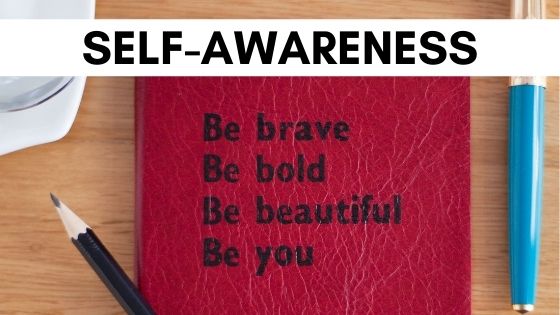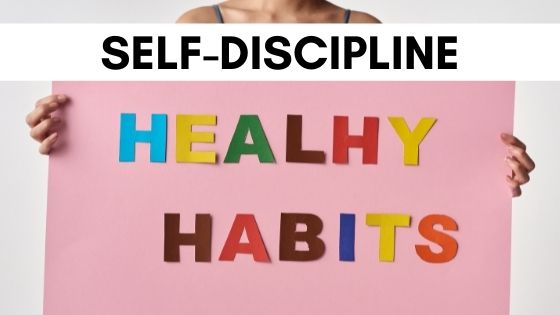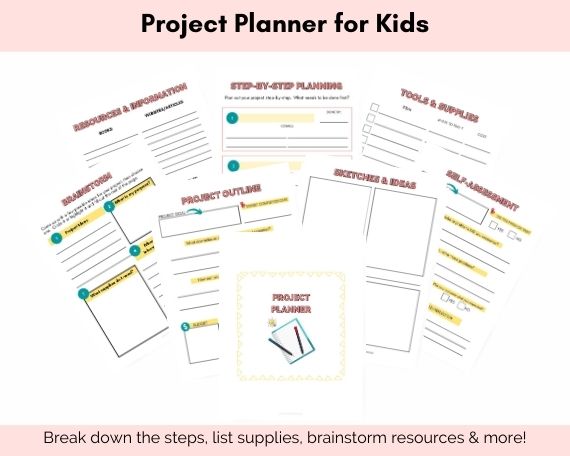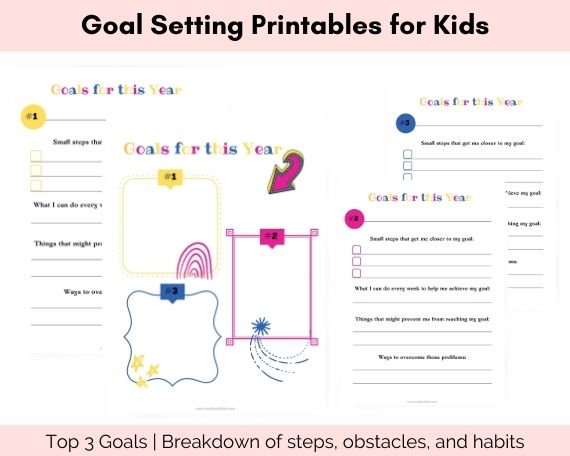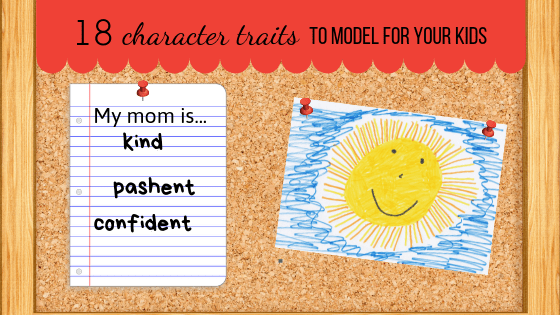Encouraging Your Kids to Be Self-Aware
When we consider the development of positive character traits in our kids, many parents instantly think of characteristics like integrity, compassion, or curiosity. I’d like to make a case for helping our kids develop self-awareness. Teaching kids self-awareness encourages them to consider their own strengths, emotions, deepest dreams, and areas they need to work on.
Self-awareness gives kids a framework to think about what they enjoy most, what their natural strengths and abilities are, and how they deal with their emotions.
(Disclosure: As an Amazon Associate I earn from qualifying purchases. This means that if you click a link and make a purchase, I may receive a small commission at no additional cost to you. I only recommend products I use and love or would love to use! For full disclosure details, click here.)


Character Trait of the Month List
Each month, as part of our homeschool learning, I choose a specific character trait to focus attention on. There are many character traits worth pursuing, but given the time frame of the school year, I narrowed my list down to ten.
3 Simple Ways to Encourage Self-Awareness
Here are three ways you can begin encouraging your child to practice self-awareness today.
VALIDATE FEELINGS
First, have ongoing conversations about how they’re feeling. When something happens that is clearly upsetting to them, give the words to describe the emotions they are experiencing. As they get older, talk about the complexity of your own emotions. Kids learn first from watching us, and we should model naming our feelings. Talk about the series of frustrations that make up a “bad day,” or how we feel bored when we haven’t been able to get together with friends for a while because as an extravert, we gain energy from hanging out with other people. To talk about this effectively, we as parents need to develop our own self-awareness!
NOTICE PATTERNS
Second, help them see patterns in how they respond to the world. For some kids, personality-type quizzes are a fun way to get to know themselves. But for every child, pay attention to ways they interact with others or traits you observe repeatedly. An introverted child may want to turn down most social invitations, and a conversation about the times they have been glad they attended an event after the fact may help them think through their initial reaction. A child who naturally loves being the center of attention can become more aware of those on the periphery and develop a sensitivity to kids who feel left out.
We want our kids to lean into their strengths and not feel that we are attempting to change them into someone they’re not. At the same time, they need to be taught ways they can navigate the world more easily by being aware of their innate thought processes and reactions.
APPRECIATE DIFFERENCES
Third, instill an appreciation for personality differences. No one wants to learn more about themselves if they fear they won’t measure up to some standard of perfection. Give your child the foundational knowledge that they were “fearfully and wonderfully made,” as written in Psalm 139. Learning more about how they think about the world, what they love, how they react and respond to inputs, or ways they learn doesn’t change the “wonderfulness” about them. Rather, it gives them tools and insight to help them respond to the world and develop healthy relationships with others.
Children can learn that not everyone feels or reacts the same way they do when faced with a challenge, put on a team with kids they don’t know, or asked to name their favorite book. By becoming more aware of their own ways of interacting, they gain understanding about how their approach to life affects those around them.
Teaching Self-Awareness to Kids with Quotes and Questions
Here are a few quotes about self-awareness, along with questions you can use to engage your kids in conversation or use as a writing assignment or journal prompt.
Know thyself.
Ancient Greek maxim inscribed at the Temple of Apollo
Question: This idea of self-knowledge or awareness is not new. Is there any downside to “knowing yourself?” What is the danger in spending too much time thinking about your own strengths, weaknesses, thought patterns, or personality traits?
(Possible answers: second-guessing all of our decisions, trying to change ourselves to be more like someone else, creating a fixed mindset about our personality and not allowing for natural changes in the way we make decisions or the things we value.)
Self-awareness is our capacity to stand apart from ourselves and examine our thinking, our motives, our history, our scripts, our actions, and our habits and tendencies.
Stephen Covey
Question: Can you “stand apart from yourself” enough to see a pattern in any of those areas: your thinking, motives, history, scripts (things you repeatedly tell yourself), actions, habits, or tendencies? How does recognizing a pattern or way of being in the past help you as you move into your future?
I knew who I was this morning but I’ve changed a few times since then.
Lewis Carroll
Question: Can you relate to this? Are there words to describe yourself that feel the most solid and unchanging? What elements of you personality feel more changeable depending on the circumstance?
How cool is it that the same God who created mountains and oceans and galaxies looked at you and thought that the world needed one of you too.
Unknown
Question: What is your reaction when you consider that thought?
More Self-Awareness Quotes
Here are a few additional quotes about self-awareness you may wish to consider as alternatives, or use in addition to the four above. These quotes don’t necessarily use the word self-awareness, but the ideas behind these quotations are related to the same concept.
A person who knows who they are is not threatened by the beliefs of others.
Robert Anthony
What lies behind us and what lies before us are tiny matters compared to what lies within us.
Ralph Waldo Emerson
Self-awareness is one of the rarest of human commodities. I don’t mean self-consciousness where you’re limiting and evaluating yourself. I mean being aware of your own patterns.
Tony Robbins
You can’t get away from yourself by moving from one place to another.
Ernest Hemingway
Self-Awareness News Articles and Reports
Here are a few sources for news articles containing stories of self-awareness. One way to teach self-awareness to kids is to show them specific examples of it in action.
Science News for Students
The website sciencenewsforstudents.org is a great resource for science-related news articles written specifically for kids.
A Secret of Science—Mistakes Boost Understanding: Great article detailing why making mistakes is valuable for learning, and failure is just a step in the process, enabling students to learn how to analyze their reasoning and make adjustments.
Top 10 Tips to Study Smarter, Not Longer: Students can try several of these effective study skills to determine which ones work best for them. By paying attention to which methods of action result in the desired outcome, you become more aware of what works for you.
DOGO News
Another source for kid-friendly news articles is dogonews.com
Suffering from Boredom? What Kind?: This article describes how digging into an emotion, in this case boredom, can reveal underlying motives and feelings.
10 Year-Old Tanitoluwa Adewumi Is America’s Newest Chess Master: This story is an example of a child as young as six recognizing something he loved and pursuing it.
Books that Explore Self-Awareness
These books explore the theme of self-awareness through engaging stories. Your Fantastic Elastic Brain by JoAnn Deak is a great introduction for kids to the idea that our brain can change and grow. Why Am I Here? by Constance Orbeck-Nilssen takes a look at why we are where we are in the world through the perspective of a child. Max Lucado’s book, You Are Special reminds children that they are special to God just the way they are. What Do You Stand For? For Teens: A Guide to Building Character by Barabara Lewis offers activities for youth to explore what positive character traits they want to stand for and profiles real kids who exemplify those characteristics.
Short Video Content Related to Self-Awareness
These links are videos I added to my kids’ Google classrooms in May to get them thinking about self-awareness.
What Is Self-Awareness (YouTube – RocketKids): Short video that does a great job explaining five benefits to becoming more self-aware.
Who Am I? – A Philosophical Inquiry – Amy Adkins (YouTube – TED-Ed): Interesting introduction to the idea of the idea of the self as both constantly changing and having a persistent identity.
Movies with a Self-Awareness Theme
Inside Out explores how a young girl manages her emotions.
Sing offers an uplifting message of chasing dreams, dealing with failure, and learning to be brave.
Akeelah and the Bee tells the story of a girl who discovers her talent for spelling and learns to accept criticism while overcoming obstacles.
Teaching Self-Awareness to Kids with Activities
Try some of these ways to develop self-awareness in your child.
JOURNAL
The act of writing about how they experience the world can help kids work through their feelings and begin to see patterns of response. Encourage your child to write about their day, with a focus less on what happened, and more on how what they experienced made them feel. Using journal prompts can be helpful for kids who struggle to get started.
Journal Prompts for Self-Awareness
- Name as many things you can think of that you like about yourself.
- What character traits are important to you in a friend?
- Write about something you love to do and wish you could do every day.
- How do you feel when you are invited to a birthday party or other social event?
- Describe a time you wished something new and exciting would happen OR a time you wished your life would stay the same?
- What makes you feel happy?
- Write about a time you felt mad at the world.
- Do you enjoy being the center of attention? Write about a time you felt like all eyes were on you.
- Write about some ways you are similar to someone else you know. How are you different?
- What accomplishment makes you feel proud of yourself?
IDENTIFY STRENGTHS
Start a list of your child’s strengths. Each time you or your child notices something they particularly enjoy or are good at, add it to the list. These can be areas of personality such as compassion or creativity, but be as specific as possible. Instead of adding creativity to the list one time, pay attention to the specific ways your child is creative. Write down the creative way they cut open a plastic straw to use as a spoon when they forgot to bring one for their applesauce.
TRY NEW THINGS
Whether or not your child enjoys being put in novel situations, much self-knowledge can be gained by trying something new. You can help your child discover something they love, learn how to handle small disappointments, and gain confidence in themselves by introducing them to new experiences.
Some kids are naturally up for a high degree of change and new situations, while others will need you to baby step them into each experience and give them plenty of time in between each new thing they try. This doesn’t have to involve trying multiple sports, instruments, or hobbies in a state of constant flux. One simple idea is to have your kids try one new food each month. Check out an area of the city they don’t ordinarily visit, play a board game they’ve never played before, or encourage them to take a class they might like.
Scriptures to Encourage Self-Awareness
As Christians, our pursuit of self-awareness helps us discern areas in which we need God to work in us to change our hearts. We learn who we are in Christ, and how we can use our unique, God-given personalities to glorify him. Our prayer is for God to use an increased knowledge of ourselves to open our eyes to his abundant grace.
We have everything we need to live a life that pleases God. It was all given to us by God’s own power, when we learned that he had invited us to share in his wonderful goodness.
2 Peter 1:3 (CEV)
I praise you for I am fearfully and wonderfully made; your works are wonderful, I know that full well.
Psalm 139:14 (NIV)
We demolish arguments and every pretension that sets itself up against the knowledge of God, and we take captive every thought to make it obedient to Christ.
2 Corinthians 10:5 (NIV)
Free Printable Self-Awareness Quotes and Questions
By subscribing to my mailing list, you have access to my printables library, where you can download a free printable list of these four quotes and accompanying questions. Use them as discussion questions, a writing assignment, or journal prompts.
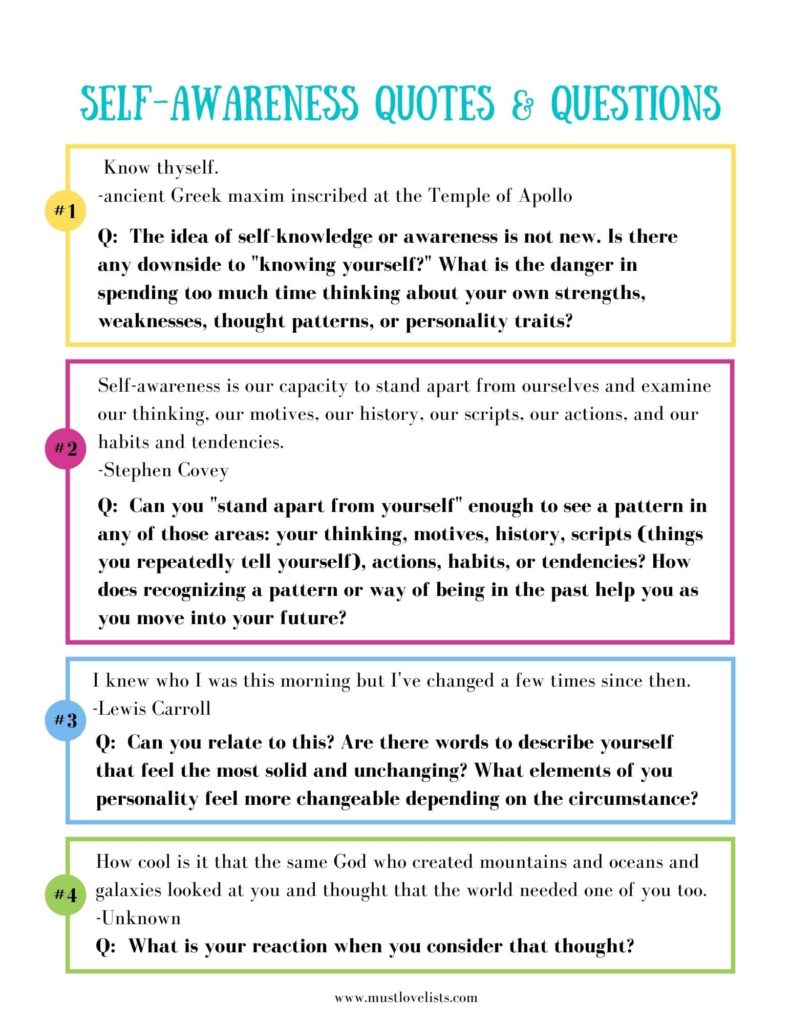

Join my mailing list to receive updates when new printable resources are added to the library, plus tips and encouragement for your organized homeschool journey.

Visit my homeschool resources page for monthly unit study ideas, projects, and homeschool planning help!
Teaching Self-Awareness to Kids
The best way to teach self-awareness to kids is of course to make it a part of your family life. Talk to your kids about how you handle areas of weakness and negative emotions. Point out ways that they naturally excel. Talk through different ways of responding to a situation and have them think about what feels most instinctive to them. The more they understand their natural inclinations and patterns of thought, the more able they are to use those tendencies when appropriate or intentionally choose an alternative response.
